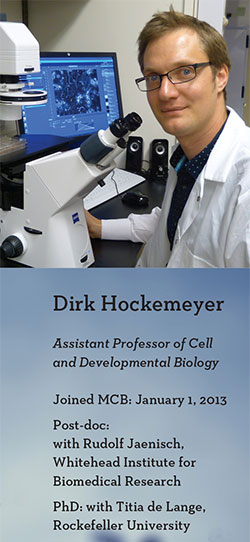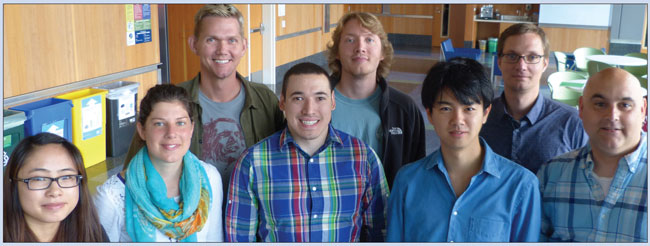MCB TRANSCRIPT

Telomeres and Tumors: How Telomerase Drives Immortality
MCB Assistant Professor Dirk Hockemeyer studies the link between telomeres — repetitive nucleotide sequences that protect chromosome ends — and how long our cells live. “If telomeres are too short, cells stop dividing or die too early,” Hockemeyer says. “If they’re too long, cells are immortal.”

Every time chromosomes replicate, they lose bits of DNA from the ends where the final RNA primers bind. Telomeres serve as disposable bits of DNA that take the hit instead, protecting coding sequences from being nibbled away with successive cell divisions.
This solution brings its own problem, however. Telomeres are lengthened by an enzyme called telomerase, which in people is made only during embryonic development and in adult stem cells. This means differentiated human cells have a set initial telomere length, limiting how many times they can divide and so dictating their ability to regenerate a given tissue. But telomerase is reactivated in 90% of human tumors — and this allows their cells to divide indefinitely.
Hockemeyer began studying telomeres as a graduate student, working with mouse cells. But mice aren’t a good system for understanding telomeres in people. “Mouse telomeres are very long because their cells always make telomerase,” Hockemeyer explains. Back then, most human telomere work was done in tumor cells, which likewise have the drawback of making telomerase all the time.
So as a post-doc, Hockemeyer pioneered technologies to genetically engineer human cells, which he now applies to study telomeres in human stem cells. “It’s an ideal system,” he says. “Stem cells make telomerase but can be differentiated into cells that don’t.”
Now he’s using genetic editing tools in human stem cells to find out how the gene for telomerase is regulated. Small changes in levels of this enzyme can make a big difference. For example, just 50 telomerase molecules per stem cell is enough for immortality. As Hockemeyer says, “Fifty versus nothing is a readout of life versus death.”
He’s also studying how the telomerase gene is silenced when cells differentiate as well as how this gene is reactivated in tumor cells. “We’re trying to extrapolate from tissue culture to what is happening in the human body,” he says.
Hockemeyer has a special affinity for MCB. Telomerase was discovered here in 1984 by then-MCB Professor Elizabeth Blackburn and then-graduate student Carol Greider, who received a Nobel Prize for this work in 2009. And today, he enjoys working with MCB Professor Kathleen Collins, a world expert in telomerase biology. “UC Berkeley is awesome,” Hockemeyer says. “It’s a very good place to collaborate and get the freedom to think about these things. The students are also fantastic and create an exciting and dynamic research environment.”
In 2013, Hockemeyer received the Glenn Award for Research in Biological Mechanisms of Aging from the Glenn Foundation for Medical Research as well as the New Scholar Award in Aging from the Ellison Medical Foundation.





